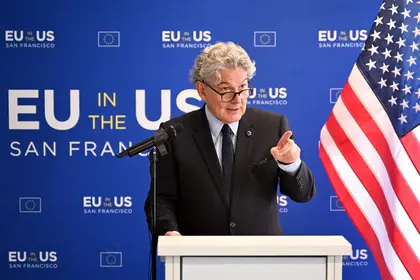The European Commission is set to discuss the viability of a “war economy mode” transition today aimed at increasing the EU’s arms production capacities by encouraging EU countries to purchase weapons together domestically, as reported by Reuters.
Russia’s full-scale invasion of Ukraine has highlighted the EU’s inability to produce and procure a large number of munitions in a short period, which has led to the munition shortages suffered by Ukraine at present.
JOIN US ON TELEGRAM
Follow our coverage of the war on the @Kyivpost_official.
Thierry Breton, the European industry commissioner, proposed the creation of a European version of the US Foreign Military Sales scheme, under which Washington assists “eligible countries” when purchasing from US arms companies.
Another proposal from Breton aimed to encourage European weapons firms to prioritize domestic orders in times of crisis.
“We need to change the paradigm and move into war economy mode. This also means that the European defense industry must take more risks, with our support,” said Breton.
Breton’s proposal included a package of €1.5 billion ($1.63 billion) in new money through the end of 2027, with a special EU fund of €100 billion ($109 billion) for defense projects.
Despite the minuscule initial sum in terms of defense procurement, officials said the package would create a legal framework that could allow much greater spending in the future if the bloc desires to do so.

Zelensky Meets CIA Director William Burns in Ukraine
However, the proposals would require approval from the European Parliament and all 27 member states, which is no easy feat considering the continued failure of the latter to reach a consensus and effectively collaborate on military affairs.
Unnamed officials also told Reuters that they aim to bring Ukraine on board the proposals to boost joint procurement and production capacities and treat Kyiv “almost equivalent to a member state.”
Breton also cited concerns over the potential victory of former US President Donald Trump in the upcoming election, whose cold stance on NATO meant Europe “must take greater responsibility for its own security.”
“In the current geopolitical context, Europe must take greater responsibility for its own security, regardless of the outcome of our allies’ elections every four years,” said Breton.
You can also highlight the text and press Ctrl + Enter






